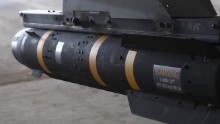U.S. missile inadvertently shipped to Cuba has been returned
The Cuban government has returned a missing U.S. missile sent to Europe for training but inadvertently shipped to Cuba, a State Department official said.
"We can say, without speaking to specifics, that the inert training missile has been returned with the cooperation of the Cuban government," Mark Toner, the State Department's deputy spokesperson, told CNN on Saturday. "The department is restricted under federal law and regulations from commenting on specific defense trade licensing cases and compliance matters, so we cannot provide further details."
"The reestablishment of diplomatic relations and the re-opening of our embassy in Havana allow us to engage with the Cuban government on issues of mutual interest," he added.
The inactive Hellfire missile had been in Cuba since 2014, sources familiar with the matter said last month.
Hellfires are air-to-ground missiles typically fired from helicopters. Although initially designed as anti-tank weapons, they are often modernized and currently deployed from drones in anti-terrorism operations.
The missile wrongly sent to Cuba is called a Hellfire Captive Air Training Missile, a "dummy missile" used in exercises. Sources said that it contained an incomplete guidance section and was not fitted with a warhead, fusing system rocket monitor or operational seeker -- all components needed to successfully hit a target.
While it was not operational, the missile still contained sensitive American weapons technology, such as targeting and sensor information, that U.S. officials said would be concerning if it fell into the hands of adversaries.
The sources said the U.S. had been trying for more than a year to get the Cuban government to return the missile. The delay could have been complicated by the attention paid to the historic thaw between the U.S. and Cuba in December 2014, followed by the restoring of ties and opening of embassies in Washington and Havana over the summer.
During its return from Rota, Spain, to the United States, the sources said missile was misrouted by the cargo-shipping firm as it traveled from Madrid for its flight back to Florida. Instead of flying from Madrid to Frankfurt, Germany, and then back to Florida, the missile was misrouted to Paris and on to Havana.
Upon realizing the mistake, the company notified the U.S. government about the error as it was required to do under its export license. Sources said it is typically the responsibility of the company that holds the license to retrieve the lost article. The company, however, asked for help from the U.S. government because the missile was in Cuba, with which the U.S. has only recently restored ties and where direct flights between the U.S. and Havana do not currently operate under an aviation agreement between the two countries.
News Courtesy: www.cnn.com











